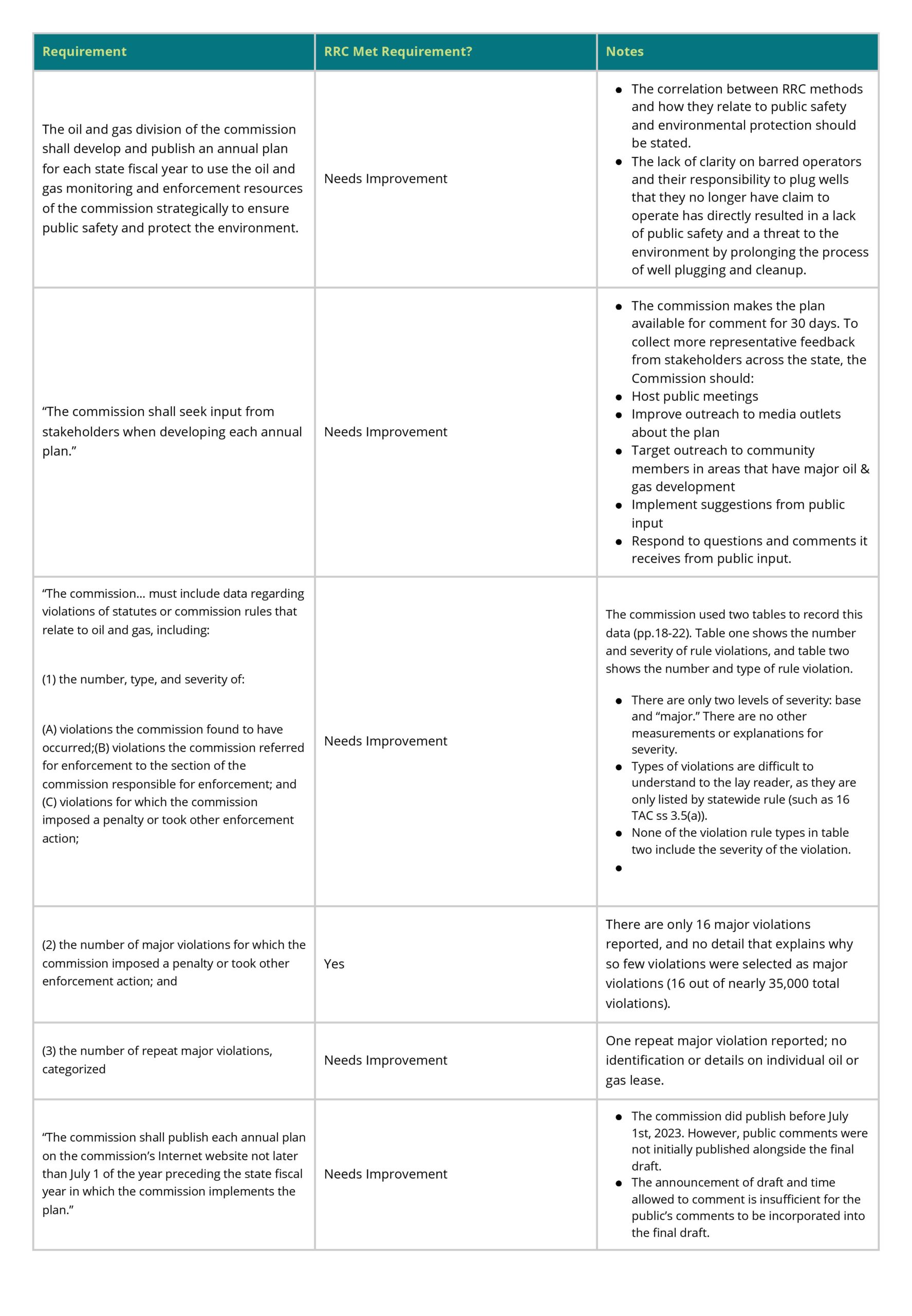By Alyssa Wallace, Commission Shift Field Organizer
The Railroad Commission’s (RRC’s) Oil and Gas Division’s Monitoring and Enforcement Strategic Plan for fiscal year 2024 was released for comment in late April with a 30-day comment period. The Monitoring and Enforcement Plan lays out the goals and the compliance and plugging strategy for the Oil and Gas division for the upcoming year. Commission Shift’s goal was to bring awareness to this important document and ensure that the public could weigh in on the plan. In order to educate the public about this opportunity, we organized a community conversation to discuss three key topics explained in the Plan: inspections, complaints, and enforcement. We had several community members attend to discuss the details of the Plan and how their own experience differs from the procedures the RRC says it follows in the Plan.
View Commission Shift’s presentation.
View the Monitoring and Enforcement Community Conversation.
The Railroad Commission recorded 13 total comments, including Commission Shift’s.
Our requests for improved language accessibility over the past two years seem to have had an effect this year. Notably, the Railroad Commission released a Spanish version of the draft plan at the same time they released the English version for comment. The commission also provided a final Spanish version of the plan once the plan was approved. Last year, they only made a final Spanish version available at the end of the comment period, but not the beginning.
Commission Shift’s team read through this year’s draft and submitted about 10 pages of comments in Spanish and English on the draft.
In this year’s Monitoring and Enforcement Plan, the commission also announced the Office of Public Engagement. The new office is meant to further the Oil and Gas Division’s first goal, outlined on page 11 of the Monitoring and Enforcement Plan: Accurately demonstrate the commission’s oil and gas monitoring and enforcement activities. This is exciting news, and something we have encouraged in the past during public input of RRC open meetings. We believe that the state oil and gas agency should work in partnership with the public to find real and just solutions for oil and gas pollution and other development-related issues. We hope that this attempt at public engagement is authentic, and not merely a superficial attempt at improving the commission’s image. One major question we have is whether the new office will improve the commission’s capacity to offer language accessibility.
The Railroad Commission did answer some of the questions from previous years in this draft. However, Commission Shift centered our campaign around public comments, and when we compared the draft to the final, hardly any changes were made.
The stakeholder participation process of public comments does not meet the HB 1818 mandate, which “require[s] the RRC, with stakeholder input, to develop and publish an annual plan to use oil and gas monitoring and enforcement resources strategically to ensure public safety and protect the environment.” If the RRC merely collects stakeholder input, but does not incorporate that input, then it is not meeting the requirements of the mandate, as it is required to do.
Community members and the Commission Shift team were thorough in pointing out concerns and asking questions regarding the barred operators list, monitoring frequency, and complaint-handling procedures. None of these questions or suggestions were responded to nor addressed in the final draft of the Plan.

It is important to take advantage of opportunities for shaping what the Railroad Commission could look like. Giving public comment on these kinds of documents has the potential to transform this important state agency. This year there were 13 comments, and hopefully next year there will be even more. While we haven’t seen significant changes to the plan immediately following the comment periods, we are seeing a few broad changes from requests made in prior years. We hope to see more impactful changes in the next year’s Plan. The purpose of Commission Shift is to elevate the importance of this agency to the public so we can work together on transforming the Railroad Commission into an agency that will lead Texas into a new energy landscape that benefits our people, economy, and environment, and leads our nation on strategies to mitigate climate change.
If you haven’t already, please subscribe to our free monthly newsletter for updates on our work and ways to get involved.
You can also RSVP to attend the Railroad Commission’s monthly virtual meetings. Commission Shift live-tweets these meetings and gives support to anyone interested in giving public input.